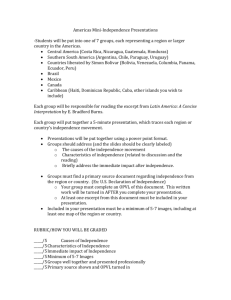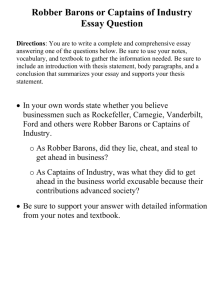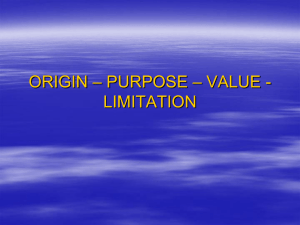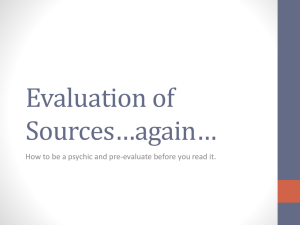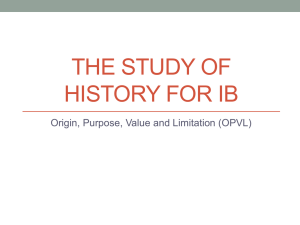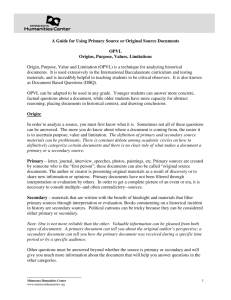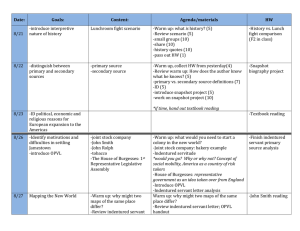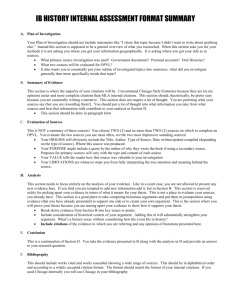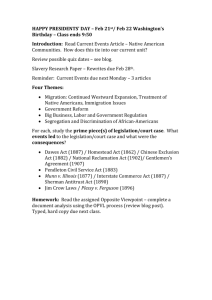Discuss these topics first: Hint, Take notes!
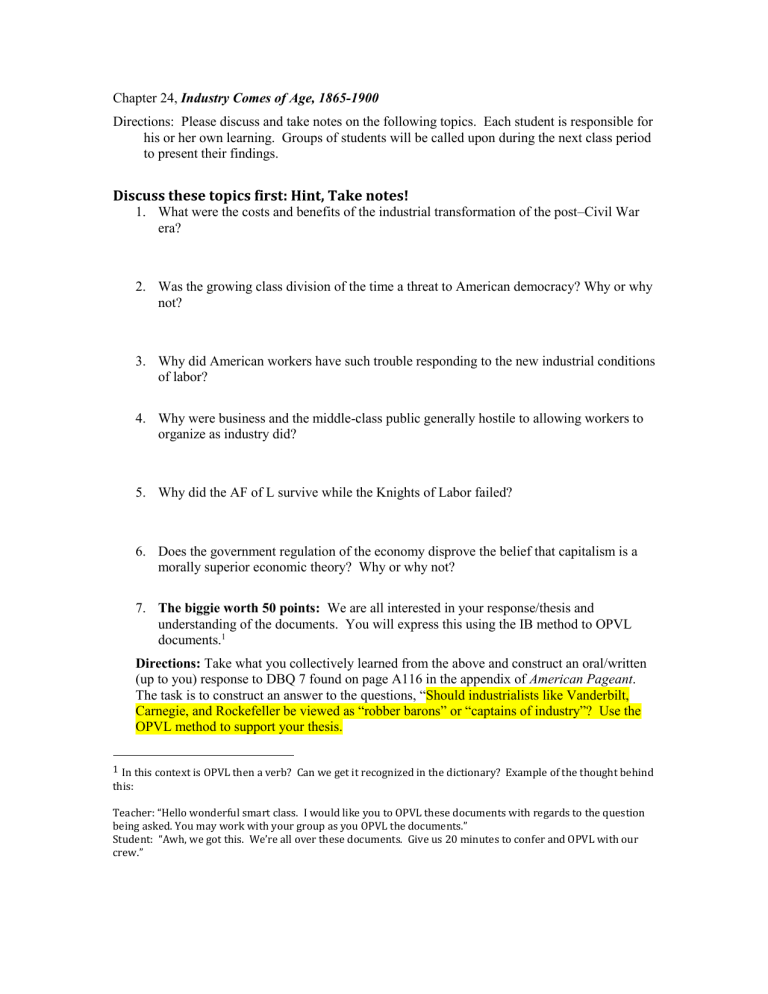
Chapter 24, Industry Comes of Age, 1865-1900
Directions: Please discuss and take notes on the following topics. Each student is responsible for his or her own learning. Groups of students will be called upon during the next class period to present their findings.
Discuss these topics first: Hint, Take notes!
1.
What were the costs and benefits of the industrial transformation of the post–Civil War era?
2.
Was the growing class division of the time a threat to American democracy? Why or why not?
3.
Why did American workers have such trouble responding to the new industrial conditions of labor?
4.
Why were business and the middle-class public generally hostile to allowing workers to organize as industry did?
5.
Why did the AF of L survive while the Knights of Labor failed?
6.
Does the government regulation of the economy disprove the belief that capitalism is a morally superior economic theory? Why or why not?
7.
The biggie worth 50 points: We are all interested in your response/thesis and understanding of the documents. You will express this using the IB method to OPVL documents.
1
Directions: Take what you collectively learned from the above and construct an oral/written
(up to you) response to DBQ 7 found on page A116 in the appendix of American Pageant .
The task is to construct an answer to the questions, “Should industrialists like Vanderbilt,
Carnegie, and Rockefeller be viewed as “robber barons” or “captains of industry”? Use the
OPVL method to support your thesis.
1
In this context is OPVL then a verb? Can we get it recognized in the dictionary? Example of the thought behind this:
Teacher: “Hello wonderful smart class. I would like you to OPVL these documents with regards to the question being asked. You may work with your group as you OPVL the documents.”
Student: “Awh, we got this. We’re all over these documents. Give us 20 minutes to confer and OPVL with our crew.”
Please read “Varying Viewpoints” on page 557
“Industrialism: Boom or Blight?”
You will be responsible for discussing and understanding this historiography presented in this essay. Please discuss the focus question below to get your started
AFTER you read the essay.
Matthew Josephson, The Robber Barons: The Great
Historiography = an understanding about which historians are presented which materials in what manner, why? = Why and what influenced this historian or school of historians to come up
American Capitalists, 1861–1901 (1934).
A view of industrialization focused on business:
“The members of this new ruling class were generally, and quite aptly, called ‘barons,’ ‘kings,’ ‘empire-builders,’ and even ‘emperors.’ They were aggressive men, as were the first feudal barons; sometimes they were lawless; in important crises, nearly all of them tended to act without those established moral principles, which fixed more or less the showed volcanic energy and qualities of courage which, under another economic clime, might have fitted them for immensely useful social constructions, and rendered them glorious rather than hateful to their people.”
Herbert Gutman, Work, Culture, and Society in Industrializing America (1976).
A view of industrialization focused on labor and society:
“In the half-century after 1843 industrial development radically transformed the earlier
American social structure, and during this Middle Period…a profound tension existed between the older American preindustrial social structure and the modernizing institutions that accompanied the development of industrial capitalism. In each of these distinctive stages of American society, a recurrent tension also existed between native and immigrant men and women fresh to the factory and the demands imposed upon them by the regularities and disciplines of factory labor.”
QUESTIONS ABOUT THE “VARYING VIEWPOINTS” PLEASE DO NOT ANSWER UNTIL
YOU READ THE ENTIRE 1 (ONE) OMG! PAGE ESSAY
1. What does each of these historians see as the most crucial feature of the new industrialization?
2. How does each of them see the relationship between industrial capitalism and the moral and cultural values of society?
3. How would each of them likely interpret the labor conflicts and strikes of the period—for example, the Haymarket affair and the decline of the Knights of Labor?
